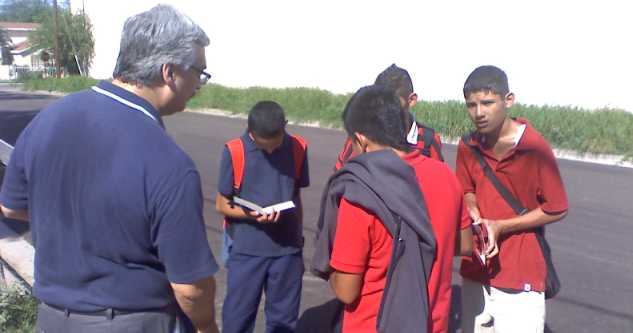By Jeff Brumley
Steadily declining mission trips to Mexico due to drug violence has left many Mexicans feeling abandoned just when their anxiety levels are peaking, missions experts in Texas say.
“It’s unprecedented,” said E. Daniel Rangel, director of River Ministry and Mexico missions for the Baptist General Convention of Texas.
Yet Rangel and others agree it’s often much too dangerous to send teams, especially youth groups, to Mexico.
The U.S. State Department warned Americans from going there, saying U.S. citizens have been victims of “homicide, gun battles, kidnapping, carjacking and highway robbery” in violence between the government and drug cartels.
The strife has curtailed everything from youth group missions to the work of called missionaries in Mexico, and has left many Mexicans feeling threatened and abandoned, said Rangel.
 Mexico-focused mission projects have plummeted from 400 annually three years ago to 80 in 2011, Rangel said.
Mexico-focused mission projects have plummeted from 400 annually three years ago to 80 in 2011, Rangel said.
Those still coming are all-adult teams who have been working in a particular region for years and have solid contacts there. The rest, usually youth groups or a mix of youth and adults, are finding somewhere else to go.
“What generally happens is people make plans to come, but when we see these articles in the paper, they cancel,” he said.
The caution has extended beyond church groups to make some missionaries leery of working in Mexico, said Dean Dickens, coordinator of field mission teams for the Cooperative Baptist Fellowship.
The situation in Mexico has become similar to those in some parts of the Middle East and Africa where missionaries are under threat, Dickens said.
“We do not have a field missionary in Mexico right now,” he said. “Most of the work has shifted to the U.S. side of the border.”
Dickens said he and his wife and team member, Karr La, are impressed with how Mexican-American pastors and their congregations have taken up some of the slack. They regularly cross into Mexico to help other churches in some of the most violence-torn areas.
“It’s not as if nothing is happening there, but you just have to be very careful,” he said.
The Mexican drug war has also created challenges to the ministries that have traditionally operated on the U.S. side of the border, said Rick McClatchy, field coordinator for CBF Texas.
Church workers and volunteers are now dealing with Mexicans worried about death threats against themselves and families, McClatchy said.
The cartels often prey on those fears by blackmailing immigrants into running drugs or committing other crimes for them.
“We have to tackle the physical and spiritual dimensions in those communities because if you don’t, you are creating the context for the drug cartels to get rooted on the Texas side of the border even more,” McClatchy said.
The situation has led many in Mexico to feel forgotten by American congregations who had once adopted them, Rangel said.
Those in Mexico understand why mission groups can’t come, but complain that the absence has come with silence from their American counterparts.
It’s important that Americans send emails to let Mexicans know they are being prayed for, Rangel said. They should also send supplies that would have been taken on the visits.
“We have to do something because the need is great,” he said.
